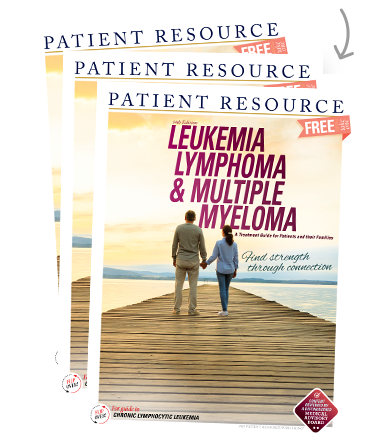Lymphoma
Caregiver Responsibilities
Caregivers serve an important role in taking care of a person with a hematologic cancer. Just as there isn’t a playbook for cancer, there isn’t a job description for a caregiver. Your responsibilities will take commitment and hard work and require a wide range of skills. They can change without warning, which will require you to be flexible.
Learn as much as you can about your loved one’s type of blood cancer so you can provide both physical and emotional support. Although you may assist with daily tasks, such as preparing meals, helping with personal care, maintaining the household and managing paperwork, you may also need to help with planning and decision-making activities.
Attending medical appointments is an important task. In addition to driving your loved one to appointments, listen carefully and ask questions to help your loved one remember key information. You may take notes, and report progress and problems to the medical team during the visits.
If your loved one is facing a chronic (long-term) condition, medication adherence will be vital. Medication schedules are challenging for some people to remember, and you may be called on to help stick to the schedule and give medication. You can also report the progress and any problems to the doctor during regular visits.
You will likely be called on to help monitor and manage the side effects of your loved one’s cancer and its treatments. Learn which side effects to watch for and what to do if they occur. Addressing them properly can improve your loved one’s quality of life. Communicate with the medical team when side effects start so they can be managed right away. Some can be dangerous if left untreated, and you could help prevent a potentially life-threatening situation by being aware of them. Ask your loved one’s medical team if you should watch for additional concerns.
By shopping for and preparing the right foods, you can help your loved one get the right nutrition during treatment. Choose foods that nourish the body and help manage the symptoms and side effects of medications. Prepare several small meals a day instead of three regular meals, and keep healthy snacks available in case your loved one is hungry between meals.
You may also be caring for your children or pets in the home. Help your loved one enjoy some downtime by taking the kids out. If your loved one prefers not to be left alone, offer to entertain the kids at home. Recognize that young children may feel worried or confused about why their parent is ill and needs help. Be prepared for such a discussion by being honest while supportive and dispel any worries that a child has may have about causing their parent to become ill. If there are teens at home, recognize that when a parent is ill, teenagers commonly assume a lot of adult responsibilities — cooking, cleaning, babysitting and giving up time with their friends. Step in and make sure that teens still get to be teens, and that when they help out, they are rewarded for pitching in. Give them an opportunity to communicate with you so they can tell you their concerns and feelings. Lastly, don’t forget the pets. Take the dog for a walk or to the dog park. Pet treats and toys are always a nice surprise. Consider boarding them if your loved one will be away from home for an extended time.
Caring for the Caregiver
Just as important is remembering to take care of yourself physically and emotionally. Don’t feel selfish for focusing on yourself. Actually, taking a break allows you to be more alert and refreshed when you are taking care of your loved one. Try hard to make time to do the following.
- Keep up with your own regular medical appointments, and let your doctor know about your added responsibilities.
- Eat healthy. Prepare nutritious foods that you enjoy and that allow you to keep up your strength.
- Be active. Try to set aside time for some type of physical activity at least 30 minutes a day.
- Find activities that reduce stress, such as mind-body relaxation techniques, reading or journaling.
- Take a break. Meet a friend for coffee and talk about something other than cancer.



